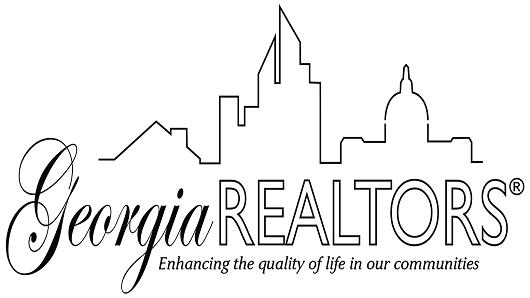Protect Yourself When Buying a Home | Brochure
Suggestions for the Prospective Homebuyer
This brochure was prepared courtesy of the Georgia Association of REALTORS® to help buyers with the home buying process. The recommendations herein are general in nature and are not intended to be exhaustive. Some of the recommendations may not apply to specific properties. Buyers are encouraged to consult with experts and professionals of their own choosing to ensure that they are protected in buying a home.
There are few things in life as exciting as buying a home. However, since homes are one of the largest purchases most of us will ever make, buyers should take reasonable steps to protect themselves in the home buying process. This brochure contains some general suggestions on how buyers can do this.
1. Read and keep a copy of any signed contract.
A purchase and sale agreement is a legally binding contract. It should be read in its entirety by the buyer before it is signed to ensure that it reflects the business agreement of the parties. Verbal promises not included in the contract are generally unenforceable. Buyers should comply with all time deadlines in a contract since missing a deadline can leave the buyer in breach of contract. Getting an early start on arranging such things as inspections and financing is the best way for buyers to avoid missing deadlines. The buyer should also keep a complete copy of any contract that he or she has signed in the event a dispute arises regarding the authenticity of the contract.
2. Have the home inspected by a professional home inspector.
Home inspectors help buyers evaluate the condition of the home based upon one or more visual inspections of the property. Most homes have at least a few items that will need to be repaired and/or replaced. A professional home inspector can assist in identifying these items by performing an inspection of the property. Requests for repairs are normally received more favorably by sellers when the need for the repairs has been documented in the report of a professional home inspector. Many home inspectors are members of professional associations that, among other things, require their members to perform a standardized inspection of the property. Buyers are encouraged to ask inspectors about their qualifications and expertise in inspecting homes before selecting an inspector.

3. Inspect the neighborhood in which the home is located.
The neighborhood in which a home is located can be as important as the home itself. Buyers should familiarize themselves with the neighborhood in which the homes they are considering buying are located to determine if there are any objectionable conditions nearby. If buyers go far enough away from any home, they will eventually discover some neighborhood condition that they wish were not there. What those conditions are and how far away they need to be from a house before they are no longer a concern is a decision that only the buyer can make. For example, a nearby grocery store may be a convenience for some buyers and a disruptive commercial use for others. Buyers can also contact local governmental planning officials to determine what changes, if any, are anticipated in a neighborhood over time.
4. Have the home inspected for termites and other wood destroying organisms and obtain an official Georgia Wood Infestation Report that can only be prepared by a licensed pest control company.
Buyers should have the home they are buying inspected by a licensed Georgia pest control company for evidence of termites and other wood destroying organisms (including powder post beetles, wood boring beetles, dry wood termites and wood decay fungi). The inspection should be done even if the home has a transferable termite warranty since these warranties normally contain exclusions. As a result, buyers can understand risks they may be assuming in this area by having an inspection performed. Obtaining an official Georgia Wood Infestation Report will identify the areas in the house where there is evidence of both active and previous infestation from termites and other wood destroying organisms. Buyers should also review any termite warranty being transferred by the seller to determine what is covered and the cost of maintaining the warranty. Some termite warranties cover both retreatment and repair while others are limited only to re-treatment.
5. Thoroughly investigate the property.
There are many other tests and studies buyers can do in deciding whether to purchase a property. These include, for example, a radon test to determine if the home has elevated levels of radon, mold tests to determine if the property has high levels of certain kinds of dangerous mold, well water tests when the property is served by well water and septic system inspections when the property is served by a septic system.
Homes should also be tested for lead-based paint. Normally, this is only an issue in homes built prior to 1978 (since after this time lead-based paint sales were prohibited). Ingestion of lead-based paint chips or particles can cause lead poisoning, a serious health condition, particularly in children. Buyers of older homes should read the EPA brochure entitled “Protect Yourself from Lead in Your Home”. Renovators of older homes should read the EPA’s Renovate Right brochure and other related materials.
Many factors can affect the value of a property and the ability of an owner to use and enjoy it. These include, for example, the school district in which the property is located, whether the property is subject to flooding, the availability and cost of property insurance, whether the property is subject to recorded covenants and the nature of those covenants, the governmental jurisdiction in which the property is located and whether the property is on an historic registry or in a special tax or zoning district. Websites exist to determine if a home was used to illegally manuafacture methamphetamine (which generates environmental contaminates) and whether registered sex offenders reside in the neighborhood. Before buying a home, buyers are encouraged to use reasonable diligence to investigate the properties they are buying for issues of special concern to them.
6. Get a survey of the property.
Buyers are encouraged to get surveys of the properties they are considering buying so that they know where the exact boundary lines of the properties are located. Buyers should request that the survey identify the location of any easements of record, whether there are encroachments onto or off of the property and whether the property is in a flood plain. Surveys are not normally done in the sale of condominium units. However, a buyer can review the condominium plat to see the location of the property that is a part of the condominium.
7. Make sure that an undeveloped lot can be developed.
In most parts of Georgia, lots cannot be developed for residential purposes unless they are properly zoned, have access to a public road and are served by water and sewer. If there is no ability to connect the lot to a public sewer, the buyer should verify that the lot can accommodate a septic system. This is done by having a licensed engineer perform a percolation test and evaluate whether the lot is sufficiently large for a septic tank and field to be installed. Similarly, if the lot is serviced by a well or private water system, the buyer should arrange to have the water tested to confirm that it is safe for drinking. Meeting with the local governmental department which issues building permits is a great way to get information about whether and how a vacant lot can be developed.
8. Buy an Owner’s Title Insurance Policy.
An owner’s title insurance policy protects the buyer if a preexisting title problem is discovered after the closing. Normally, a title insurance policy is purchased and issued at the closing by the closing attorney. A title problem can be as simple as a neighbor claiming to own a small portion of your property based upon a disputed fence line. However, it can also be a serious problem, such as a forged deed, where you could lose the title to your property. Mortgage lenders require the buyer to pay for title insurance covering the lender’s interest in the property. However, in a world where there is an increasing amount of identity theft and the forging of documents, title insurance covering the owner is also recommended. There are different types of title insurance policies offered in Georgia. The most comprehensive are sometimes referred to as “enhanced title policies” and in some cases they protect buyers from title claims arising even after the closing date. Since the premium for title insurance is paid only once, it is recommended that buyers obtain the comprehensive policy.
9. Consider Purchasing a Home Warranty.
Georgia law does not require the seller of either a new or existing home to provide the buyer with a home warranty. If the seller is not offering a warranty, buyers can purchase a limited warranty on both new and existing homes as a part of the purchase of the home. Buyers should review the terms of any warranty that is offered or purchased to understand what it covers and excludes and how to file a claim.
10. Choose a REALTOR®.
Not all licensed real estate salespersons (or brokers) are REALTORS® . REALTORS® agree to abide by a Code of Ethics in their dealings with buyers and sellers. REALTORS® are members of the National Association of REALTORS® and participate in a local Board of REALTORS® . A REALTOR® typically have valuable knowledge regarding the price at which other homes in a neighborhood sold, how to negotiate various terms in a purchase and sale agreement and the features of different homes. REALTORS® can also provide buyers with and help them fill out a pre-printed purchase and sale agreement form. REALTORS® routinely work with and, upon request, can provide buyers with the names of attorneys, mortgage lenders, home inspectors, termite companies and persons providing other services relating to real estate transactions. Therefore, when buyers need help in finding the right home, they should always choose a REALTOR® first!
THIS FORM IS COPYRIGHTED AND MAY ONLY BE USED IN REAL ESTATE TRANSACTIONS IN WHICH __Drew Jackson_____IS INVOLVED AS A REAL ESTATE LICENSEE. UNAUTHORIZED USE OF THE FORM MAY RESULT IN LEGAL SANCTIONS BEING BROUGHT AGAINST THE USER AND SHOULD BE REPORTED TO THE GEORGIA ASSOCIATION OF REALTORS® AT (770) 451-1831
Copyright© 2015 by Georgia Association of REALTORS®, Inc.




Leave a Reply
Want to join the discussion?Feel free to contribute!